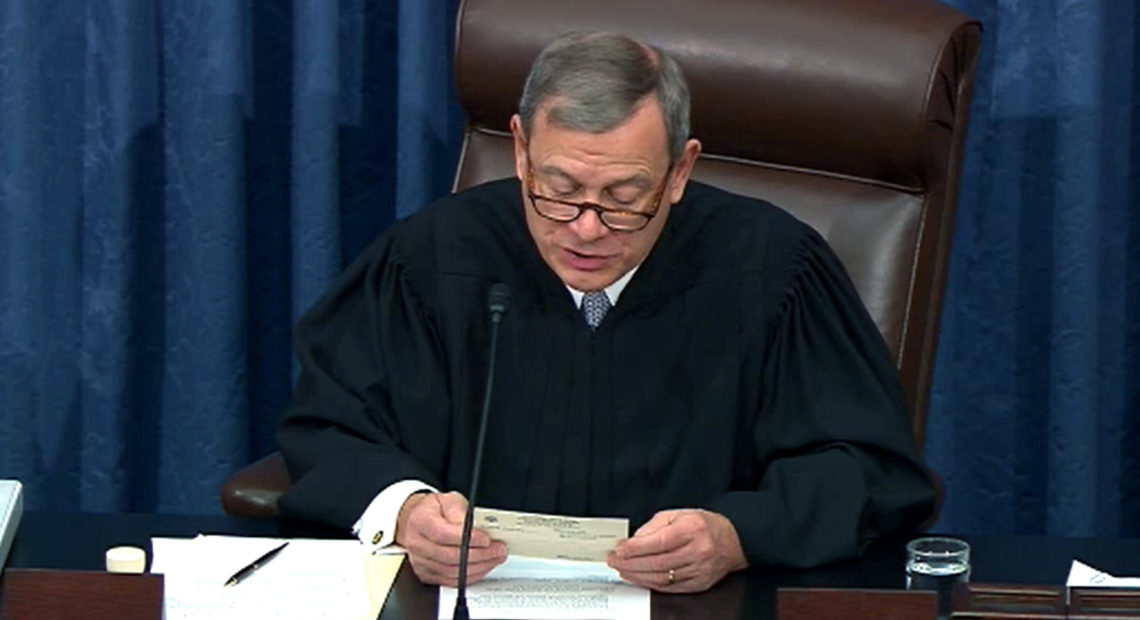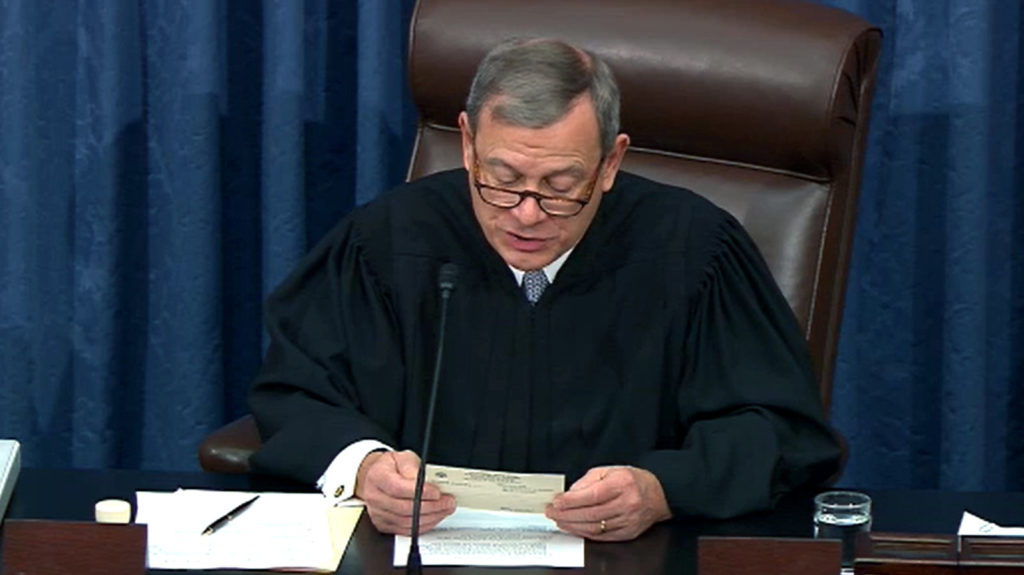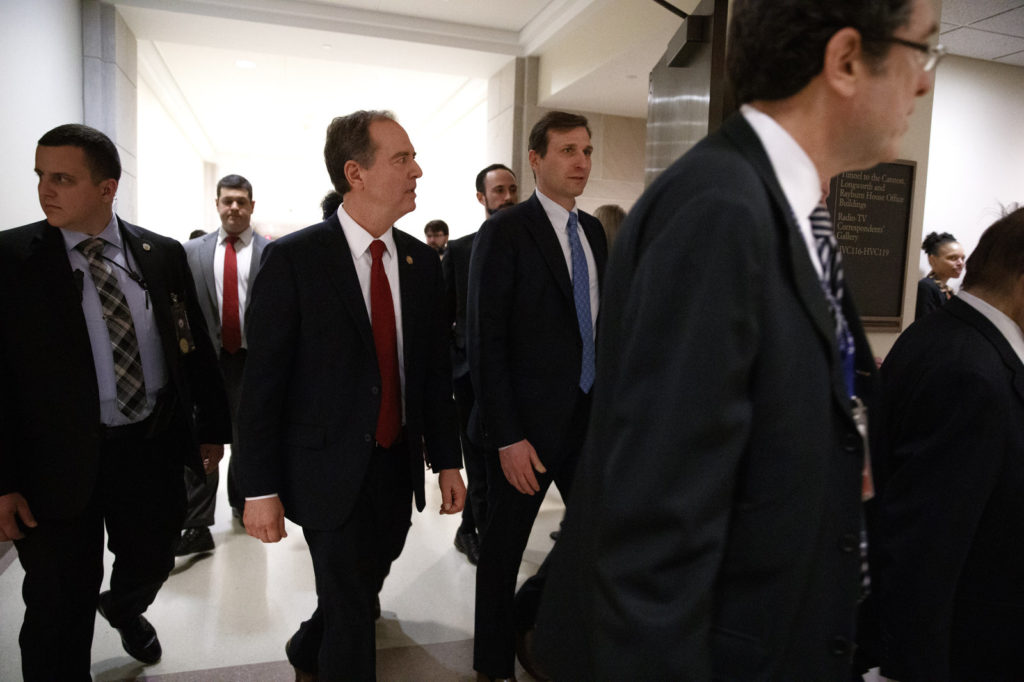
Day 9 Recap: Senators Wrap 2nd Day Of Questions; Vote Expected Friday On Witnesses
NOTE: The Senate impeachment trial continues Friday, Jan. 31, 10 a.m. PT. Watch live here. Listen here.
BY BRIAN NAYLOR & BOBBY ALLYN
Senators weighing impeachment charges against President Trump spent Thursday firing questions at lawyers as they did the day before, just as the prospect of former national security adviser John Bolton’s appearance as a witness continues to stoke speculation. The Senate will enter its next phase Friday — considering whether to allow witnesses and evidence.
The president faces two articles of impeachment: abuse of power and obstruction of Congress related to accusations that he held up military aid to Ukraine until the country announced investigations into potential political rival former Vice President Joe Biden and his son Hunter.
Late Thursday, Sen. Susan Collins said she would vote in support of allowing witnesses:
I will vote in support of the motion to allow witnesses and documents to be subpoenaed. My full statement: https://t.co/VuhZv6CO5e pic.twitter.com/LhQlnvPaoc
— Sen. Susan Collins (@SenatorCollins) January 31, 2020
Democrats need four Republicans to support their push for witnesses. But late Thursday night, Sen. Lamar Alexander of Tennessee said he would not vote in favor of allowing witnesses, putting in doubt the prospects of the trial moving forward.
On Thursday night at a rally in Des Moines, Iowa, days ahead of the caucuses Monday, President Trump took jabs at House Managers prosecuting him over alleged abuse of office and obstruction of Congress.
“Congressional Democrats are consumed with partisan rage and obsessed with a deranged witch hunt hoax,” said Trump to a booing crowd.
“We’re having probably the best years we’ve ever had in the history of our country, and I just got impeached. Can you believe these people? I got impeached. They impeached Trump,” Trump said. “That’s not gonna work. Watch. Just watch,” Trump said. “They want to nullify your ballots, poison our democracy and overthrow the entire system of government. That’s not happening.”
Roberts refuses early question
U.S. Chief Justice John Roberts, presiding over the trial, refused to read a question from Sen. Rand Paul, R-Ky.
“The presiding officer declines to read the question as submitted,” Roberts said.

Chief Justice John Roberts, who reads the questions at the impeachment trial, blocked one query from Sen. Rand Paul, R-Ky., which may have revealed the identity of the whistleblower whose complaint sparked the impeachment inquiry.
Senate Television via Getty Images
It is believed that Paul’s question would have identified the whistleblower whose complaint sparked the House’s impeachment investigation of Trump.
The person’s identity is protected by law, and neither Roberts nor Majority Leader Mitch McConnell, R-Ky., want it to be in the official trial record. McConnell had urged senators to be respectful of Roberts, who is supervising the trial as specified in the Constitution while also attempting to keep above the partisan aspects.
“Madness”
House impeachment manager Adam Schiff, D-Calif., took issue with the wide view of presidential powers put forth by Trump attorney Alan Dershowitz on Wednesday.
In response to a question about whether a quid pro quo in the foreign policy arena was ever appropriate, Dershowitz said, “Every public official that I know believes that his election is in the public interest.”
He added, “If a president does something which he believes will help him get elected in the public interest, that cannot be the kind of quid pro quo that results in impeachment.”
After wide condemnation by Democrats and on social media, Dershowitz said his comments were misinterpreted.
But Schiff declared, “That way madness lies, if we are to accept the president essentially can do whatever he wants.”
“Join us”
The answer to one question posed by Republican senators must have brought joy to the president’s ears. Asked whether the president has the best interests of Americans and their families in mind, Trump attorney Eric Herschmann recited a litany of positive economic statistics in what may have sounded like a Trump reelection ad.
“There are more than 7 million jobs created since the election. Illegal border crossings are down 78% since May, and 100 miles of the wall have been built. The unemployment rate is the lowest in 50 years,” he said.
Turning to the House managers, he concluded, “Maybe we could even get more done. Let’s try something different now. Join us. Join us. One nation, one nation, one people.”
Sen. Warren considers chief justice’s position
Sen. Elizabeth Warren, D-Mass., had a sharply worded question for the House managers.
“At a time when large majorities of Americans have lost faith in government, does the fact that the chief justice is presiding over an impeachment trial in which Republican senators have thus far refused to allow witnesses or evidence contribute to the loss of legitimacy of the chief justice, the Supreme Court and the Constitution?”
Schiff answered by first saying, “The chief justice has presided admirably.”
He added that the country “does deserve a fair trial,” which, for Democrats, means calling witnesses.
“If they don’t get that fair trial, it will just further a cynicism that is corrosive to this institution and to our democracy,” Schiff said.
Acquittal at hand?
The Senate is expected to finish the 16 hours of written questions on Thursday night. On Friday, the Senate is expected to convene at 1 p.m. ET and have up to four hours of debate — equally divided between the managers and president’s counsels — on whether to consider more evidence or witness testimony.
It is possible that at the end of that debate (or any time during or thereafter), the Senate will go in to closed session for private deliberation on the witness question. Only in closed deliberation can they speak to one another on the floor. There is no time limit for closed deliberations.
If the motion to consider more evidence is approved — a 51-vote majority is required — then senators can offer motions on which witnesses and documents they want to subpoena.
A 50-50 tie fails. Technically, the presiding officer, Roberts, could move to break a tie, but he is not expected to insert himself into a political process.

Rep. Adam Schiff (second from left), the lead House Democratic impeachment manager, leaves a news conference on Capitol Hill on Tuesday, Jan. 28, 2020. CREDIT: Jacquelyn Martin/AP
If the motion fails, there are still any number of procedural motions Democrats could offer, and there is potential for another long series of votes. For example, Democrats could offer motions requesting more time to debate, but these would likely be delaying tactics or protest votes that will not affect the outcome.
When the lawmakers are done debating all motions, the Senate will then vote on each article of impeachment. Those votes could occur as early as Friday evening. Republicans would like Trump to be acquitted by then, but Democrats are working to recruit enough members to support bringing in witnesses to testify.
That effort is flagging, senators say.
“The momentum is clearly in the direction of moving to final judgment on Friday,” said Sen. John Barrasso, R-Wyo. “We still have a couple members who said they want to listen to answers to questions, but that’s where the momentum is in the caucus right now.”
Senate Minority Leader Chuck Schumer, D-N.Y., tried to walk a tightrope when he gave his assessment on the possibility of bringing in witnesses.
“Probably no,” Schumer told reporters on Wednesday. “But is it a decent, good chance? Yes.”
Democrats need to persuade at least four Republicans to cross party lines in order to lock in enough votes to subpoena witnesses.
Among the most-discussed potential witness is Bolton, who has drawn attention because of a report in The New York Times that he wrote in a forthcoming book that the president had directly linked the aid for Ukraine to an investigation of the Bidens.
Speaking before Thursday’s session, Schiff said the Trump administration has “gone to extraordinary lengths to put a muzzle on John Bolton to avoid calling him as a witness, to avoid letting the American people hear what he has to say.”
Another House manager, Rep. Jerry Nadler of New York, left the door open to the possibility that the House may subpoena Bolton if the Senate doesn’t.
“We will see,” Nadler said.
Republicans’ witnesses
If the door does open to witnesses, Republicans have indicated they would like to call people such as Hunter Biden, who had served on a Ukrainian energy company board.
Republicans might also call the whistleblower.
Asked what kind of delay witnesses would add to the trial, Trump defense lawyer Jay Sekulow said “months.”
“This would be the first of many weeks.”
But Schiff bristled at this argument, saying Trump’s defense team is exaggerating the delay to discourage senators from supporting calling witnesses, including Bolton.
“You can subpoena John Bolton,” Schiff said. “Don’t be thrown off by this claim, ‘Oh, if you even think about it, we are going to make you pay with delays like you’ve never seen. We’re going to call witnesses that will turn this into a circus.’ It shouldn’t be a circus. It should be a fair trial. You can’t have a fair trial without witnesses.”
Some Republicans have been discussing a possible deal involving a witness-for-witness swap, in which Bolton might be exchange for Biden. Sen. Lindsey Graham, R-S.C., said that if Republicans are able to call just one witness, it will be Biden.
“Because he’s incredibly relevant to whether or not President Trump had a reason to believe that corruption was afoot in the Ukraine,” Graham told reporters on Wednesday.
The speaker: This will leave a mark
At her weekly news conference on Thursday, House Speaker Nancy Pelosi, D-Calif., said nothing can remove the asterisk Trump will now carry after having been impeached by the House.
Trump “will not be acquitted,” she said. “You cannot be acquitted if you don’t have a trial. You don’t have a trial if you don’t have witnesses and documentation. I would hope that the senators, if it comes to a tie or if there’s a question of hearing testimony or receiving documents, they would leave it up to the chief justice.”
Pelosi also said she was “very proud of our managers,” saying they have been “magnificent custodians of the Constitution.”
NPR’s Brakkton Booker, Lexie Schapitl and Claudia Grisales contributed to this report.
Copyright 2020 NPR. To see more, visit npr.org















